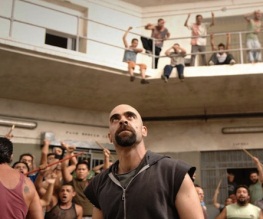Cell 211

Cell 211 begins with a man tearing open his wrists and bleeding out in a sink full of water. This seemingly gratuitous scene has its reasons; the man is Morao, left to suffer in cell 211 from an undiagnosed brain tumour. His wry carving into the wall: ‘Morao’s headache killed him here’ introduces us to Daniel Monzón’s conception of the Spanish prison system, where inmates are crooks, guards are even bigger crooks, and medical attention is irrelevant for men who are going to die anyway.
Juan Oliver (Alberto Ammann) is thrust into the middle of this as he turns up early for his first day as a prison official, telling his pregnant wife Elena (Marta Etura) that he wants to make a good impression. As riots break out Juan awakes, head bloody, in Morao’s cell. He is swift to react, abandoning all trappings of his old life, save a wedding ring, to pose as a new inmate. Assigned as the menacing Malamadre’s (Luis Tosar) adjutant, Juan lies and manipulates his way to safety until an event forces him to rethink his status as a free man.
The ascension of this newbie from nobody to somebody is a proposition hard to swallow in a facility where the ‘lifer’ is prized above all. He has a nickname, ‘Calzones’ (shorts – due to his lack of them in a strip search), and even invents a crime: the homicide of a drug lord who sold his brother some ‘bad shit’. A protagonist out of his comfort zone, strip searches, riots, saintly wives, and crooked guards. So far, so prison fare. Where it becomes interesting is the tools used for the rebellion; namely, three Basque terrorists, held hostage by Malamadre to push for better living conditions and medical care. If they are killed by the inmates, reaction from the terrorist organisation ETA will be severe, and ramifications far-reaching.
Yet Monzón all but abandons this thread, leading us through a predictable plotline about a rogue guard Utrillo, the evolving ethics of an increasingly unhinged Juan and romantic flashbacks of Elena and Juan under the bed covers. Though potentially incendiary, given that the ETA is real and a hot topic in Spain, examination of the Basque terrorists could’ve made for a far more satisfying plot. Nevertheless, the film does what it does well, and the desertion of a tricky political concern makes the subtitled film easier for a foreign audience with no prior knowledge of the subject.
With the media manipulation of Don Siegel’s Riot in Cell 11, and the severed ear of Tarantino’s Reservoir Dogs, Cell 211 certainly fulfils tropes. Yet despite the cliché of some of its situations, an electrifying premise and sharp cinematography ensure that this prison drama is no cop-out.






Recent Comments